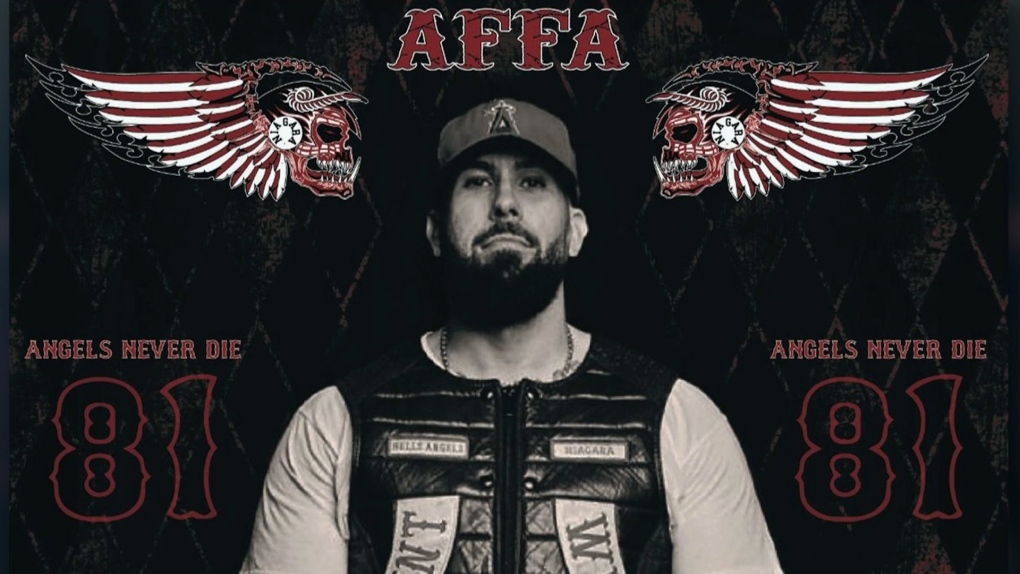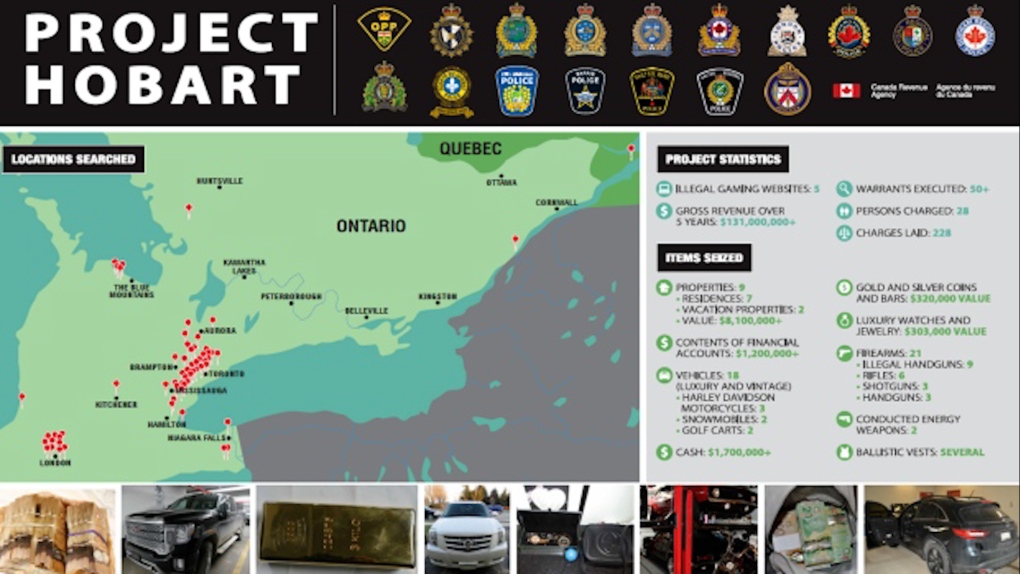Multi-million dollar Ontario Hells Angels court case could collapse because of delays
An organized crime investigation that had police across Ontario work for two years infiltrating a group allegedly funnelling millions of dollars to the Hells Angels is on the brink of falling apart, with charges tossed against major figures thanks to court delays, CTV News Toronto has learned.
In a case where the wheels of justice moved so slowly they fell off, at least six allegedly central figures will walk away without a criminal record after their charges of being involved in an underground gambling organization were stayed by an Ontario judge.
“As an investigator, it’s obviously very frustrating to know that any of these charges were dismissed as a result of the delay,” said retired detective Mark Mendelson, reacting to the news.
“All the time and effort, all the expense that an investigation like this would cost, basically, for this, is for nothing,” Mendelson said.
The investigation involved a coordinated effort among 14 police agencies starting in 2018, and was called Project Hobart. Its target was a series of sports betting websites and cash operations in an underground gambling ring that over six years funnelled some $160 million to the Hells Angels in Ontario, the documents say.
But besides the cash that was collected by a hierarchy of middlemen, authorities said in court documents the operation’s other currency was threats, intimidation, and force.

“Collection of debts was enforced through violence,” lawyers for the Attorney-General of Ontario wrote in a brief. “Profits flowed upwards from Agents to Master Agents and Super Agents, who each kept a commission and paid the remaining profits to the leaders of the organization.”
CTV News Toronto has learned that the organization was surveilled, and then infiltrated by OPP officers. One of the group’s alleged enforcers, Michael Deabaitua-Schulde, was being watched when he was shot dead by a rival gang outside a Mississauga gym — a witness account crucial to convicting the gunmen.

Undercover agents used a chance encounter with one of the four partners allegedly running the gambling side to forge a bond with him.
The trust grew enough to repeatedly meet with that partner at a cottage on Robert’s Island, some 70 kilometres north of Barrie, where they discussed business and how the underground scheme worked.
In 2019, police forces executed multiple search warrants around southern Ontario, arresting more than 30 people and finding weapons and cash.
In a news conference, senior officers declared that by disrupting the money, they had stopped future violence.
“The objective of Project Hobart was to put an end to violence perpetrated by criminal organizations intending to further their financial interests,” one said at the time.
But despite those significant resources, crown prosecutors in Brampton could not move the case forward ahead of the deadline imposed by the Supreme Court for criminal cases.

Most of the time, a criminal case has 18 months to get to trial in the Ontario Court of Justice, and 30 months to get to trial in Ontario Superior Court. Any longer, and defense can ask that the charges be thrown out.
That’s what happened for at least six people, records show, and a survey by CTV News Toronto of other charges laid indicates several other cases were withdrawn.
It’s a problem that got a lot worse during the COVID-19 pandemic: in 2020, Statistics Canada counted roughly 4.5 per cent of all adult criminal cases in Ontario went past the limit. By 2021, that had risen to 8.2 per cent. That’s about one in 12 cases.
In an environment with limited resources, prosecutors are having to make tough choices, said criminal lawyer Ari Goldkind. The choice may have been to let what might have seemed like a non-violent crime of running a betting website slide.
“Organized crime, money laundering rings go unpunished and unprosecuted, and it’s a shame,” Goldkind said.
Referring to the death of Michael Deabaitua-Schulde, he said, “You wouldn’t have a homicide without the underlying gambling ring.”
Charges against the two members of the Hells Angels, Robert Barletta and Craig McIlquham are still proceeding in Superior Court, as the 30-month deadline applies in those cases.
Authorities did succeed in getting several tax judgments, including $50,000, $90,000 and $217,000 — and are still applying to seize some $270,000 worth of cash seized in the searches.
CTVNews.ca Top Stories

Richard Perry, record producer behind 'You're So Vain' and other hits, dies at 82
Richard Perry, a hitmaking record producer with a flair for both standards and contemporary sounds whose many successes included Carly Simon’s 'You’re So Vain,' Rod Stewart’s 'The Great American Songbook' series and a Ringo Starr album featuring all four Beatles, died Tuesday. He was 82.
Hong Kong police issue arrest warrants and bounties for six activists including two Canadians
Hong Kong police on Tuesday announced a fresh round of arrest warrants for six activists based overseas, with bounties set at $1 million Hong Kong dollars for information leading to their arrests.
Read Trudeau's Christmas message
Prime Minister Justin Trudeau issued his Christmas message on Tuesday. Here is his message in full.
Stunning photos show lava erupting from Hawaii's Kilauea volcano
One of the world's most active volcanoes spewed lava into the air for a second straight day on Tuesday.
Indigenous family faced discrimination in North Bay, Ont., when they were kicked off transit bus
Ontario's Human Rights Tribunal has awarded members of an Indigenous family in North Bay $15,000 each after it ruled they were victims of discrimination.
What is flagpoling? A new ban on the practice is starting to take effect
Immigration measures announced as part of Canada's border response to president-elect Donald Trump's 25 per cent tariff threat are starting to be implemented, beginning with a ban on what's known as 'flagpoling.'
Dismiss Trump taunts, expert says after 'churlish' social media posts about Canada
U.S. president-elect Donald Trump and those in his corner continue to send out strong messages about Canada.
Heavy travel day starts with brief grounding of all American Airlines flights
American Airlines briefly grounded flights nationwide Tuesday because of a technical problem just as the Christmas travel season kicked into overdrive and winter weather threatened more potential problems for those planning to fly or drive.
King Charles III is set to focus on healthcare workers in his traditional Christmas message
King Charles III is expected to use his annual Christmas message to highlight health workers, at the end of a year in which both he and the Princess of Wales were diagnosed with cancer.

































